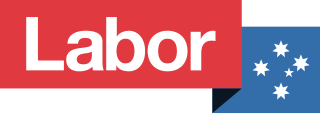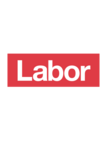
The Australian Labor Party (ALP), also known simply as Labor or the Labor Party, is the major centre-left political party in Australia and one of two major parties in Australian politics, along with the centre-right Liberal Party of Australia. The party has been in government since the 2022 federal election, and with political branches active in all the Australian states and territories, they currently hold government in New South Wales, South Australia, Victoria, Western Australia, and the Australian Capital Territory. As of 2024, Queensland, Tasmania and Northern Territory are the only states or territories where Labor currently forms the opposition. It is the oldest continuous political party in Australian history, having been established on 8 May 1901 at Parliament House, Melbourne; the meeting place of the first Federal Parliament.

Rosemary Follett is an Australian former politician who was the first Chief Minister of Australian Capital Territory, serving in 1989 and again between 1991 and 1995. She was the first woman to become head of government in an Australian state or territory.
The Residents Rally (RR), officially known as the Residents Rally for Canberra Inc and also known simply as the Rally, was an Australian political party that was active during the early years of self-government in the Australian Capital Territory (ACT). It was led by human rights lawyer Bernard Collaery, who described it as a "community-based urban green party".

The leader of the Australian Labor Party is the highest political office within the federal Australian Labor Party (ALP). Leaders of the party are chosen from among the sitting members of the parliamentary caucus either by members alone or with a vote of the party’s rank-and-file membership. The current leader of the Labor Party, since 2019, is Anthony Albanese, who has served as the prime minister of Australia since 2022. There have been 21 leaders since 1901 when Chris Watson was elected as the inaugural leader following the first federal election.

The 1989 Australian Capital Territory election was held on 4 March 1989 to elect the 1st Australian Capital Territory Legislative Assembly. This was the first direct election by voters in the Australian Capital Territory (ACT) for their power legislative body.

Andrew James Barr is an Australian politician who has been serving as the 7th and current chief minister of the Australian Capital Territory since 2014 and the treasurer of the Australian Capital Territory since 2011. He has been the leader of the Australian Capital Territory branch of the Australian Labor Party (ALP) since 2014 and a member (MLA) of the ACT Legislative Assembly since 2006.
Wayne Bruce Berry is an Australian former politician who was a member of the unicameral Australian Capital Territory Legislative Assembly from 1989 to 2008, representing the electorate of Ginninderra for the Labor Party. Berry served as Deputy Chief Minister from 1991 to 1994, Leader of the Opposition from 1997 to 1998 and Speaker of the Assembly from 2001 to 2008.

Elections to the 1992 Australian Capital Territory Legislative Assembly was held on Saturday, 15 February, alongside a referendum on an electoral system for future elections. The incumbent Labor Party, led by Rosemary Follett, was challenged by the Liberal Party, led by Trevor Kaine. Candidates were elected to fill seats using the modified d'Hondt electoral system for a multi-member single constituency. The result was another hung parliament. However, Labor, with the largest representation in the 17-member unicameral Assembly, formed Government with the support of Michael Moore and Helen Szuty. Follett was elected Chief Minister at the first sitting of the second Assembly on 27 March 1992.
The Australian Capital Territory House of Assembly was the main elected representative body of the Australian Capital Territory between 1975 and 1986, during which time preparation began for the granting of self-government to the Territory. The Assembly had a largely advisory role, with most of the power over the Territory being in the hands of the relevant federal minister.

Andrew David Kennedy is an Australian radio broadcaster and former politician. He was a member of the House of Representatives from 1969 to 1972, representing the Division of Bendigo for the Australian Labor Party (ALP). He later served in the Victorian Legislative Assembly from 1982 to 1992, representing the seats of Bendigo (1982–1985) and Bendigo West (1985–1992). He was a schoolteacher prior to entering politics.
This is a list of members of the South Australian House of Assembly from 1933 to 1938, as elected at the 1933 state election:
Andrew Whitecross is an Australian former politician who was a member of the Australian Capital Territory Legislative Assembly from 1995-1998, elected to the multi-member electorate of Brindabella for the Labor Party. Whitecross was elected the third ACT Legislative Assembly at the 1995 general election as a Labor member. He succeeded former Chief Minister Rosemary Follett as Leader of the Opposition in March 1996, and continued in that position until his replacement by Wayne Berry in August 1997. He recontested the seat at the 1998 general election, but was unsuccessful.
Paul Russell Whalan is an Australian political lobbyist and former politician who was a member of the first Australian Capital Territory Legislative Assembly. He served as the leader of the ACT Labor Party in the mid-1980s and was the leader of the party's Right faction.

The Deputy Chief Minister of the Australian Capital Territory is the second-most senior officer in the government of the Australian Capital Territory. The position has been a ministerial portfolio since its establishment in 1989. Unlike in other states and territories, the deputy chief minister of the ACT is not nominally appointed by an administrator or vice-regal, but by the chief minister.
The ACT Labor Party, officially known as the Australian Labor Party (ACT Branch) and commonly referred to simply as ACT Labor, is the Australian Capital Territory branch of the Australian Labor Party (ALP). The branch is the current ruling party in the ACT and is led by Andrew Barr, who has concurrently served as chief minister since 2014. It is one of two major parties in the unicameral ACT Legislative Assembly, and is currently in a coalition with the ACT Greens.

A leadership spill of the Australian Labor Party (ALP), then the opposition party in the Parliament of Australia, was held on 31 May 1977. Former Treasurer Bill Hayden unsuccessfully challenged Labor leader Gough Whitlam. Whitlam was narrowly re-elected by 32 votes to 30 leading him to later refer to many in his caucus as 'out of touch'.
Maurene Horder is an Australian former politician. She is notable for having been the first woman to be the parliamentary leader of the Australian Labor Party in any state or territory of Australia, and also for having been the first parliamentarian in the Australian Capital Territory to give birth whilst a member. Since leaving politics in 1985, she has been a senior executive.
Robyn-Lyn Walmsley is an Australian former politician. She was an Australian Labor Party member of the former Australian Capital Territory House of Assembly from 1979 to 1985.
The Canberra Liberals, the division of the Liberal Party of Australia in the Australian Capital Territory (ACT), have held a number of leadership elections and deputy leadership elections. The most recent was in October 2024, with Leanne Castley currently serving as party leader.

The Alliance, sometimes known as the Liberal–Residents Rally Alliance, was a political alliance between the Liberal Party, Residents Rally and Independents Group in the Australian Capital Territory Legislative Assembly.













